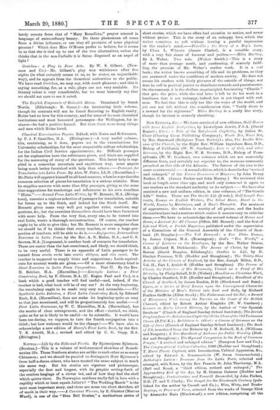NOVELS.—Life by the Fells and Fiords. By Bjornstjerne Bjornson. (Strahan.)—This
i8 a volume of well-executed sketches of Scandi- navian life. These Northern stories are as like to each other as so many 'Chinamen; and we should be puzzled to distinguish Herr Bjiirnson's from half-a-dozen others, who have treated the same subject in much -the same way. But his stories are vigorous and picturesque, especially the first and longest, with its graphic setting.forth of the restless longings of a clever lad, and of how they find the shell which quiets them. Do Norwegian maidens really fall in love with a rapidity which at least equals Juliet's ? "The Wedding March" is the next most important story, and there are some ten short sketches, all -of merit in their way.—A Constant Woman, by E. Glaister (Marcus Ward), is one of the "Blue Bell Stories," a meritorious series of
short stories, which we have often had occasion to notice, and never without praise. This is the story of an unhappy love, which the writer contrives to tell without leaving a painful impression on the reader's mind.—Priscilla : the Story of a Boy's Love, by Clara L. Wilmets (James Clarke), is a sensible story, with a very fair share of humour and pathos.—Miles Harling. By A. Weber. Two vols. (Walter Smith.)—This is a story of more than average merit, and confirming, if scarcely fulfil- ling, the promise of Mr. Weber's earlier work. It is a real book ; the writer knows something of life and its problems, as they are presented under the conditions of modern society. He does not amuse his readers with lively pictures of the outside of things, nor does he call in poetical justice to distribute rewards and punishments. On the contrary, it is the shallow, unprincipled, fascinating " Charlie " that gets the prize, while the real hero is left to do his work in a loneliness that is pot unhappy, indeed, but is yet tinged with sad- ness. We feel that this is only too like the ways of the world, and yet one not left without the consideration that, " Verily there is a reward for the righteous." Miles Harting is a really Sue story, though its interest is scarcely absorbing.


































 Previous page
Previous page